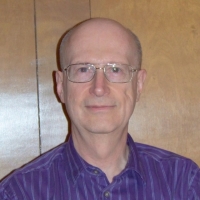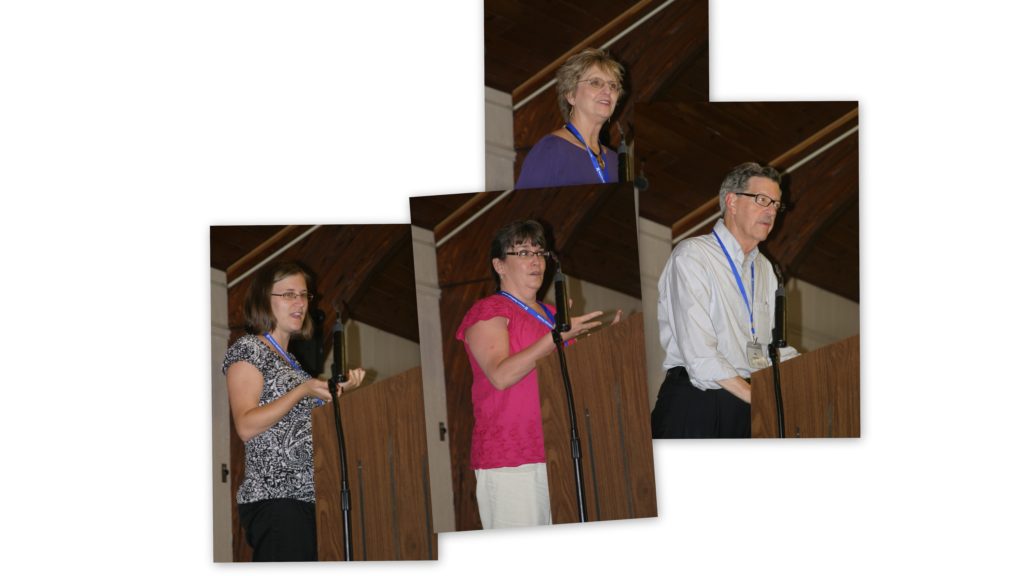Mennonite Health Journal
Articles on the intersection of faith and health
An Integrated Anabaptist Healthcare Organization
Paul D. Leichty, editor
from Mennonite Health Journal, Volume 14, No. 2, July 2012
The Gifts and Challenges for Mennonite Healthcare Fellowship
The opening plenary session of the first MHF Retreat on June 29, 2012 provided an opportunity to reflect on the significance of the new integrated Anabaptist healthcare organization. Jone Friesen, who served as consultant for the Implementation Team that led in the transition process led a panel of persons which included Beth Good, Rebekah Good Charles, and Joe Longacher, each of whom was a member of the Implementation Team from 2010-11 and served as co-chair of a Task Force. Stan Reedy, President of the first Board of Directors, offered some follow-up comments. The following represents reflections by Executive Director Paul Leichty based loosely upon the compilation of panelists’ notes.
Mission Statement. Mennonite Healthcare Fellowship (MHF) is an interdisciplinary community of Anabaptist health professionals that seeks to nurture the integration of faith and practice, provide opportunities for dialogue on health-related issues, and address specific needs through education, advocacy and service.
Mennonite Healthcare Fellowship (MHF) was born out of a rich history of two previous associations of healthcare professionals. Both Mennonite Medical Association (MMA) and Mennonite Nurses Association (MNA) began in the 1940’s as Mennonites became more engaged with the larger North American society, pursued higher education, and entered into a life of professional service.
The healthcare field in those days was made up primarily of doctors and nurses. MMA and MNA provided a means by which Mennonite healthcare professionals could reflect and act upon the implications of what it meant to be both Mennonite and professional. As Christians, family life was also an important component of their faith journey and thus both associations had a strong emphasis on supporting families as well.
In the first decade of the 21st century, it became increasingly obvious that changes in the larger society and the church were calling for changes in these associations as well. Among the most significant changes are the following:
- Doctors and nurses are no longer the only healthcare professions.
- Models of healthcare delivery are changing as individual healthcare professionals increasingly become part of larger healthcare systems.
- An increasing level of expertise is required in all healthcare professions leading to longer periods of education.
- It is no longer unusual for Mennonite young adults to enter healthcare professions but rather seen as a typical response to the desire of Christian young adults to live a life of service that will also financially support their families.
- Mennonites themselves are more diverse in the 21st century
By 2007, both MNA and MMA began asking, “How can we as Anabaptist organizations be relevant in today’s world?” How can we more effectively reach out to a new generation of healthcare professionals who are not just doctors or nurses? They agreed to work together and in 2008 formed a study team to determine the feasibility of a new organization. In 2009, that study team presented a proposal for a new organization that would be multidisciplinary and have a global presence. Following a period of working out the details of implementation in 2010 and 2011, MHF was launched in June 2011.
So what is the vision for MHF? What are the opportunities and challenges presented with this vision? Examining the Mission Statement more closely helps us answer the question.
The vision: MHF is an interdisciplinary community.
- The opportunity is to develop the full range of professionals from many different viewpoints working together in an integrated, multi-faceted organization With the current technology, there are many creative possibilities for an interactive organization that truly spans the globe. The challenges are that the vast majority of current participants in MHF are physicians and nurses. Attracting other professionals will take work.
- The opportunity is to become a model for many voices in dialogue and collaboration between disciplines as we honor and value the different perspectives that each person brings. The challenge will be to make sure that each discipline maintains connections with their discipline group, with an equal voice that can then be fully integrated into MHF.
The vision: MHF nurtures the integration of faith and practice.
- The opportunity is to support and nurture each other in a common Christian faith that transcends professional boundaries and indeed learns from other professions in the practice of our faith in our professions. The challenge is to actually be open to the many voices around us, listening and truly hearing, being alongside each other, without being judgmental, as we struggle with the complex issues of healthcare today.
The vision: MHF is a vehicle for Anabaptist health professionals wherever they are located to develop relationships, stay connected and dialogue on pertinent issues and concerns on an ongoing basis.
- The opportunity is to have a global presence and develop relationships throughout the world around all aspects of service, education and advocacy. The challenges are to expand beyond mainstream North American Mennonite groups and use the previous strong mission emphasis to propel us into a mutual partnership in God’s mission around the world.
The vision: MHF is a viable and dynamic resource to Anabaptist health professionals, other Anabaptist organizations and to the healthcare arena as a whole.
- The opportunities are virtually limitless! Many levels of involvement with each other, our churches, and other Anabaptist groups can be explored. The challenge is to make the best use of our resources of people, finances, and time to enable MHF as an organization to serve its members, the church, and our world.
When it comes to resources, Joe Longacher noted the saying that “if you want to know someone’s priorities, read their checkbook stubs.” He expanded the more narrow definition of “checkbook stubs” to encourage all of us look at our expenditure of time and energy as well as finances. These are the ways in which we discover our true values and priorities.
Jone Friesen used her own story as an illustration of the vision for MHF. She came out of the Mennonite Brethren rather than the Mennonite Church tradition and from rural Oklahoma instead of one of the Mennonite centers in the East and Midwest. Even though she didn’t know what the word “Anabaptist” meant and knew no other member of MNA or MMA, she was drawn to MNA because she wanted the connection with other Mennonite health professionals, to be part of the dialogue, part of the greater whole.
Joan’s hunch is there are many other Anabaptist health professionals in the same situation, scattered throughout the world, who would be drawn to be part of a dynamic faith community of Christian healthcare professionals.
How will this happen? How will MHF live up to the vision set before us? How will we take advantage of the opportunities and respond to the challenges? Rebekah Good Charles reminded us that in the end, it will happen only by the power of the Holy Spirit in our midst. As the hymn we sang reminded us, “we are weak and selfish too.” Our prayer is thus in the title line, “Holy Spirit come with power.” (Hymnal: A Worship Book #26) May it be so!
About the author
 Paul D. Leichty, M.Div. is Executive Director Emeritus, having served as the first Executive Director of Mennonite Healthcare Fellowship (MHF) from Sept. 2011 through May 2020. Paul has served as a pastor, church musician, computer support person, disabilities advocate, and administrator/organizer of a number of church-related ministries. Paul also served as Executive Director of Congregational Accessibility Network which was transformed in 2022-23 to Disability Ministry Network. He is a member of Agape Fellowship of the Mennonite Church in Williamsport, Pennsylvania where he lives with his wife, Twila Charles Leichty.
Paul D. Leichty, M.Div. is Executive Director Emeritus, having served as the first Executive Director of Mennonite Healthcare Fellowship (MHF) from Sept. 2011 through May 2020. Paul has served as a pastor, church musician, computer support person, disabilities advocate, and administrator/organizer of a number of church-related ministries. Paul also served as Executive Director of Congregational Accessibility Network which was transformed in 2022-23 to Disability Ministry Network. He is a member of Agape Fellowship of the Mennonite Church in Williamsport, Pennsylvania where he lives with his wife, Twila Charles Leichty.

